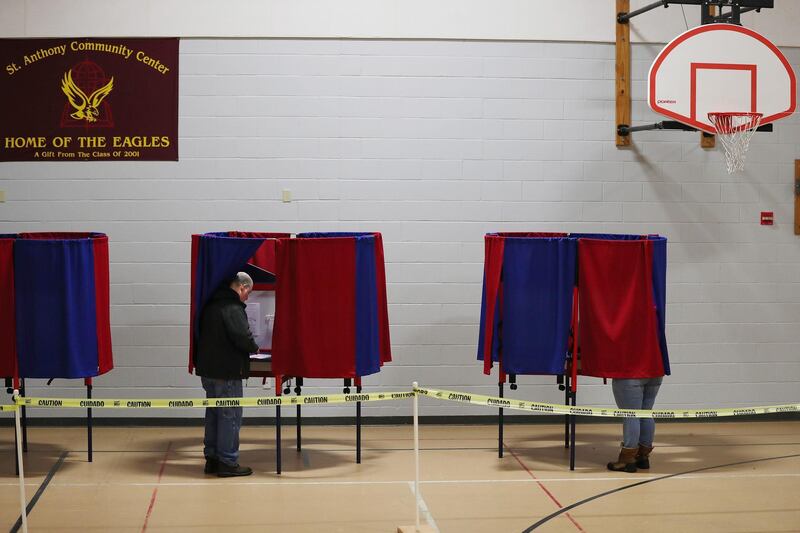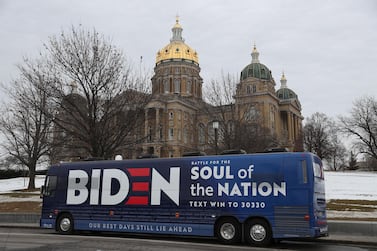The battle for the US presidency gets properly under way with Tuesday's election in New Hampshire, a small north-eastern state, where the Democratic Party picks its preferred choice for presidential nominee. Meanwhile, two seemingly contradictory narratives are emerging. The first is that the Democratic Party is simply incapable of winning against incumbent president Donald Trump and his Republican Party. The second is that there is just no way the Democrats can lose.
Both narratives are based on the same belief: that the success of the eventual Democratic nominee on November 3 – the day of the presidential election – will have nothing to do with his or her domestic and foreign policy agendas.
The doom-and-gloom forecast for the Democrats is based on the chaos after the Iowa caucus, when the party was unable to adequately explain technological failures that held up the tabulation of final results. The ensuing confusion left the Democratic Party looking shell-shocked and promoted the impression of incompetence and unpreparedness.
A more upbeat line comes from political scientist Rachel Bitecofer, a professor at Christopher Newport University and a senior fellow at the Washington think tank Niskanen Centre. In 2018, Ms Bitecofer became famous for accurately predicting the nature and size of the Democrats’ win in the November mid-term elections. What’s more, she made her prediction months ahead of the polls and stuck to it. So the findings of her 2020 election model, released ahead of the New Hampshire primary, have attracted considerable attention. They are startling.
Ms Bitecofer reckons that the Democrats will almost certainly win back the White House, gain congressional seats and may even have a chance at retaking the Senate. She has said her analysis is about “flipping giant paradigms of electoral theory upside down” because the election depends on turnout rather than the candidate or their policy positions. This would be a controversial, deeply contested view for any election almost anywhere in the world, but especially for that of the US presidency, with its long, hard-fought campaign.
In a funny sort of way, Dr Bitecofer’s theory that the Democrats will win 2020 irrespective of their choice of candidate, chimes with the more despairing narrative mentioned earlier: that Democrats cannot win against Mr Trump no matter who the party picks as its nominee.
Both assumptions are just that – assumptions. The domestic and foreign policy positions taken by the Democratic presidential hopefuls are certainly not inconsequential in the primaries. If anything, Mr Trump’s shock 2016 election win showed that even an unlikely presidential candidate can upend a tough and crowded primary contest on account of their personal style and world-view.
Now, those who seek to replace Mr Trump are trying to do the same by offering contrasting views of America’s role in the world and especially in the Middle East.
This was apparent in the leading Democratic candidates’ most recent televised debate. Most of the seven candidates on the debate stage called time on Mr Trump’s aggressively pursued America First policies by advocating instead for more diplomatic initiatives, the rebuilding of alliances and a rethink when it comes to the overseas deployment of US military personnel, as well as a nuanced approach to their withdrawal.
Three of the leading candidates – Pete Buttigieg, former mayor of South Bend, Indiana; former vice-president Joe Biden and senator Bernie Sanders – argued against the fatal US strike in December on Qassem Suleimani of Iran's elite Quds Force.
Mr Buttigieg, who emerged from the Iowa caucuses as joint winner along with Mr Sanders, said he believed Suleimani’s actions had led to the killing of hundreds of Americans but he would have wanted to see more evidence of an imminent threat before ordering such an attack. “If we learned nothing else about the Iraq war, taking out a bad guy is not a good idea if you don’t know what you’re doing,” said the 38-year-old Afghan war veteran.
Mr Biden agreed that as president he “wouldn’t have ordered the strike [because] there is no evidence yet of imminent threat … Look what happened, [Mr Trump’s] America First policies made America alone”.
And Mr Sanders declared: “You cannot go around saying, ‘You’re a bad guy, we’re going to assassinate you’…if that happens, you’re opening the door to international anarchy … every government in the world will then be subjected to attacks and assassination."
The candidates expressed scepticism about continuing US military involvement in Iraq and Afghanistan, and how America could lay down the role of world policeman. Mr Biden suggested it was by having “allies who will join us in dealing with failed states and terrorism".
In sharp contradiction to recent US policy in Syria, many of the candidates emphasised the need for America to keep its word rather than renege on its commitments to the Kurds. Making a jibe at what he called Mr Trump’s “17th-century approach” to national security strategy, Mr Buttigieg said it was no more than a “big wall and a moat full of alligators” at a time that America and the world is “facing fundamentally different challenges from asymmetric warfare to cyber security threats”.
At this point in the presidential campaign, it is clear that foreign policy will continue to feature in the Democratic primaries and that it will subtly influence the selection of Mr Trump’s eventual opponent. And while voter turnout may determine the results of the general election, were any Democrat to win, it would mean a substantial shift in US foreign policy.






